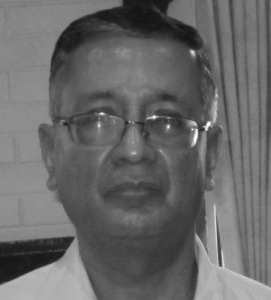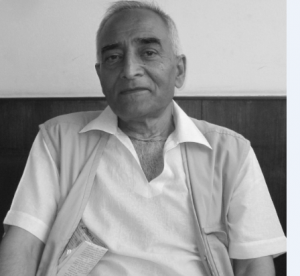-Dr. Upendra Gautam
Hydro power/Development expert, Nepal
# Dr Upendra Gautam is the secretary general of the China Study Center Nepal. Gautam is known as a senior scholar and hydropower/development expert. Coincidently, Dr Gautam was a college mate of senior journalist, political analyst and former minister the late Shrish Shumsher Rana, who was associated with this weekly ( People’s Review) from the beginning.
We requested Dr Gautam to share his experience about the late Rana who passed away on 30 December 2022. Dr Gautam’s recollection of the late Rana is given below:
Question: Senior journalist Shrish S Rana passed away on 30 December 2022. How do you feel?
Answer: His was an untimely passing away; in him, the country lost a brilliant patriot, a royal citizen with conviction and integrity. For him, the country’s legitimacy emanated from the network of institutions rooted in core cultural, historical, geopolitical and geo-strategic values. His passing away was a great personal loss to me. We remained friends forever and were in regular, candid and honest communication for the last 50 years (1971-2021) — starting from undergraduate university studies to professional ties. The last communication Shrish shared with me was on 21 March. It was his Himal Online TV YouTube interview of 20 March 2022. He was deeply concerned about the authoritative independence of the motherland as he said in the interview, “the country has passed into foreign-induced turbulence embedding all sort of interferences.” We could not see each other in person in 2022. The whole year was almost a year of hospitalization for him.
Q: During my informal meetings with the late Rana, he used to mention your name in several contexts. Indeed, you both were friends at best. What was the main characteristic of this sustained friendship?
A: I do not think I had the ability to influence him. I found he was intelligent enough to systematically read and understand my thinking and working behavioral patterns. I incline to be an introvert-loving a regular life where things are under manageable control. Shrish was much more comprehensive and substantively a public person by the core. He was dedicated to the basic cause of the people and the country. His doors were always open for new as well as old friends. He believed in keeping all channels of communication open. He saw a very clear and definite constitutional role for the royal institution in state governance. He always went beyond an individual monarch and was very convinced on the relevance of the royal institution to Nepali society. I had in 2005 edited a bilingual (Chinese-English) book entitled “Nepal’s China Relations Towards New Integration.” The book was published in Beijing. Shrish contributed an article to it. In the article, he compared Nepal’s institution of the monarchy with the Communist Party of China for their basic common values and functionality in preserving national integrity, power and harmony.
We co-existed, learned and shared together. We were never suspicious of each other. During only one time in our 50 years of interaction, I felt sorry for Shrish when he wanted to cool me down on King Gyanendra’s step to take over the rule of the government under the Constitution of the Kingdom of Nepal, 1990. In one of several candid conversations with him, I referred to my interview published in the Telegraph Weekly Nepal on King Gyanendra before the takeover. I had expressed my trust in King Gyanendra saying, he would be modern and would never take a step that shall be “conventional.” His step made me very disappointed. But before we separated, we regained the magnanimity inherent in our friendly ties distilling them again.

Q: Do you have any insights about him which have not been made public yet?
A: I have said he was a public person. It is not an easy task at all to understand Shrish in all his dimensions. In several university and college years, we, classmates and the academic faculty ranked him as a political pundit. After the political science classes, we met informally and one of his priorities would be to take stock of the finished classes and get a refresher from me on how the classes progressed. He much enjoyed engaging in political socialization and student affairs looking beyond the campus. My refresher seemed enough for him to excel. The secret was: he would link the class work and my library learning with his empirically gained political theories contextualized on Nepal and the society beyond the campus.
• A whole lot thought of Shrish as a hardliner Pancha. This had to do more with his birth, residence and connection with the members of the royal family and the Royal Nepal Army. Shrish was born to a civil, globally exposed Rana family. But personally, he was much a dignified commoner than an aristocrat. For many, he was a hypocrite when he behaved with humility and innocence while socializing. Shrish never had a double face or a clandestine blink in any meetings. He was amazed when he had for the first time a plate of buff momo in a restaurant at Ranjana Galli. He had told us, “I never had an idea about such food.” He could crack a joke on his stupidities during moments of socialization with a broad smile.
• Shrish formally joined the media stream by associating him with “Manas” (2039 B.S.) and “National Star” weeklies. My senior brother the late Devendra Gautam and I were associated with Nepal Post biweekly and Current publications as chief editor and foreign editor respectively. We were used to exchanging news and views. We never tried to impose one’s view and a news angle on another. We were however one on the cardinal point of the right to freedom of expression. Being in media, we never cultivated an exclusive partisan and vested notion of the right to freedom of media or press (practically degenerating into the personal freedom of the media publisher and editor) which is so fashionable in today’s democratic order. We were clear that media or press freedom is a condition derived from the fundamental right to freedom of expression of people from all walks of society. We were continuously used to debating, supporting and learning from each other how to manage and use our media in a way to enable the people to exercise their fundamental right to freedom of expression as our own derivative media right shall be nonexistent without people’s right to freedom of expression. Shrish and his Manas/National Star group showed solidarity with Nepal Post group by allowing Nepal Post Group to publish Manas in cooperation with Nepal Post group when the Nepal government brutally suppressed publications of the Nepal Post group continuously on the alleged ground of its connection with the Ramraja Prasad Singh’s “terrorist” group.
We continued our professional solidarity through the co-editing of translated works. One such work of pioneering importance was “Counter Investigation”, a book, by Devendra Gautam. It was an English translation of Anusandhan Bhitrako Anusandhan by Tirtha Raj Tuladhar. Shrish writing an “Editor’s Note” to the book has said, “this masterpiece on Nepali society as a whole becomes an eye-opener on its own”…on police raj in Panchayat years.
• King Gyanendra appointed Shrish as a minister of Communication in the Council of Ministers that the King chaired himself. We missed the opportunity to see each other during his ministerial assignment. Out of the ministers appointed by the King, Shrish was a rare one who had a sound grounding in theories of communication (Karl Deutsch, 1912-1992) and pluralism (Robert Dahl, 1915-2014). Shrish was well familiarized with the theory of communication that worked in the modern world as nerves of the government. The theory of pluralism in a democratic order asked for an ability to harmonize different interest groups to fairly optimize the authoritative allocation of values. Shrish’s ministerial experience in a single word was not modern. The palace bureaucracy had a thick line of red tape. A few in the ministerial team had a dubious character and they were always ready to disown the royal institution and escape the responsibility at the slightest of challenges. Shrish seemed to be a voice of modernism in the corner. Realizing such a situation in the Cabinet, he moved on with his ministerial responsibility in a non-partisan, down-to-earth and fair way. Politically, he was always convinced that a fair allocation of political values has the ability to modernize and reform even a feudal governance system. A constitutional system with the royal institution could take the lead in such modernization and reform.
Shrish had a deep sense of history and the changes Nepal had gone through in the name of constitutional reform and development. For him, only targeting a king individually would not solve the problem. Consistent and systematic modernization and reform across the whole governance structure was a must. Even the Royal Nepal Army, believed to be an inalienable part of the royal palace, distanced itself from the Royal Palace security when the constitutional king’s whole family was killed in it.
Shrish has indeed foreseen Nepal’s continued tragedies long before. He had full trust in the ancient wisdom: A wrong could never be right unless duly corrected.
Text courtesy: The People’s Review Weekly dated January 14, 2023: Ed. Upadhyaya.
